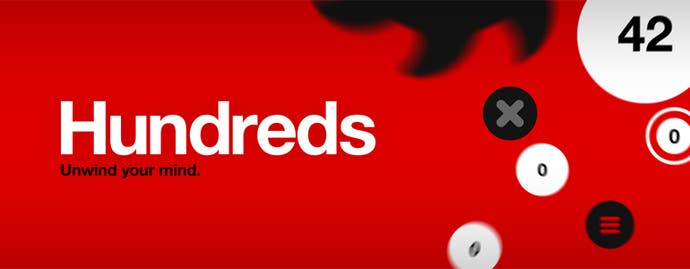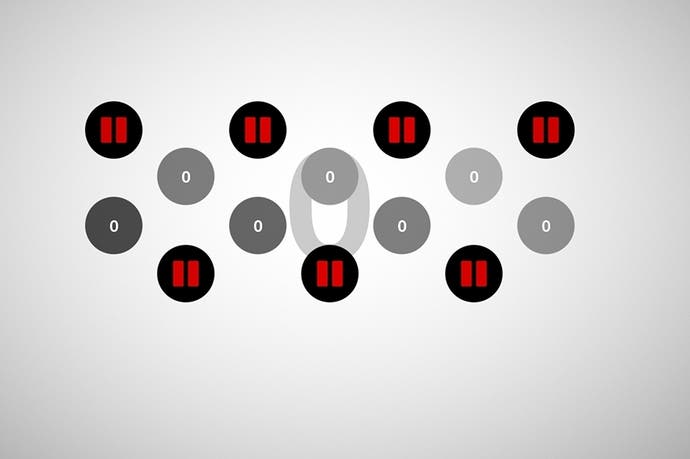Hundreds review
Uncommon cents.
Playing a good puzzle game is like watching an experienced stand-up comic riffing on a joke. There's the initial elation at the elegant construction and the skilled deployment of ideas, and then the anxious wait as you see how long and how far the concept can be spun out before it loses momentum and spirals out of control.
Hundreds, a whip-smart minimalist puzzler from Solipskier co-creator Greg Wohlwend, was originally a Flash game released on Newgrounds before indie icon Adam 'Canabalt' Saltsman and his publisher, SemiSecret Software, picked up the open source game and began working with Wohlwend to hone and polish it for a commercial release.
Not that it needs much in the way of streamlining, since Hundreds is a magnificently simple game. There are circles. When you press one it gets larger, with a big bold number that counts upwards as you go. If you can get the sum total of all the circles on the screen to equal 100, you win. However, while expanding, the circles turn red and become vulnerable. Contact with anything while expanding - including other circles - means instant game over.

From this immediate and intuitive baseline, Wohlwend, Saltsman and their team begin to riff. Each of the levels - there are 100, naturally - introduces a new element that complicates the process. The circles begin to move, for example, meaning that expansion must be carefully timed so as not to collide with the other circles. Circles are paired up, joined by elastic lines. These must be expanded at the same time, or else nothing happens. Some levels start you with large circles that have a minus total on them, doubling your workload.
There are obstacles too. Some are wandering buttons that can be paused, fixing them in place, where they can prove to be help or hindrance in keeping your circles apart. Most infuriating are whirling gears which immediately shrink a circle back down to zero.
You even get your recommended portion of indie pretension, as cryptic homilies are unlocked as you play, hidden behind codes that progress from simple anagrams to fiendish cyphers. It's certainly nicer to be told "Persistence without patience is like a golden harp without its chord" than simply "Keep trying", but it's unclear what these elements add to the game, and their linguistic trickery feels at odds with the graceful vector simplicity of the rest of the game.

It's a deftly constructed puzzler though, and one that delights more than it frustrates. New ideas are introduced at welcome regular interludes, until the game has a whole palette of hurdles to mix and match. At the most basic, primal level, the act of growing and balancing these serene bubbles to a burbling ambient soundtrack does something very pleasant to your brain chemistry.
The whole falls just short of perfection though. Many levels rely more on timing and luck than any real brainwork, a problem compounded if you're playing on the more cramped iPhone screen rather than an iPad. Solving others can mean waiting several minutes for the perfect opportunity to appear at random, while the next may be a strictly defined puzzle with only one solution.
It's certainly not enough to take the shine of an otherwise stunning game, but it does give progression a weird rhythm and means that Hundreds never quite finds the pace needed to stretch its often brilliant ideas over the full century. For the sheer amount it gets right, however, it's well worth your time.









